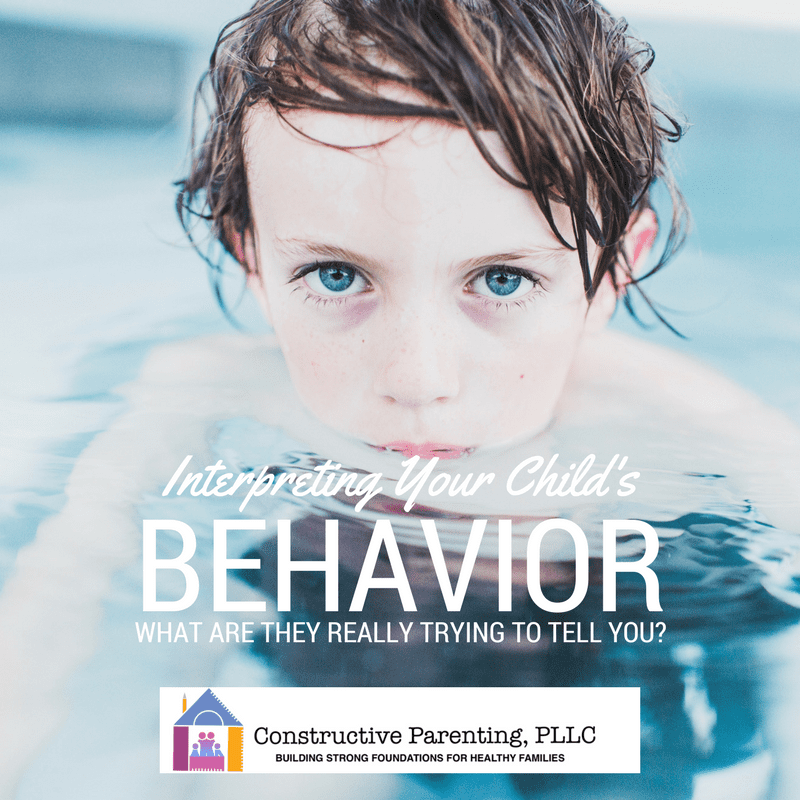Interpreting Your Child’s Behavior: What Are They Really Trying to Tell You?

Consider the last time you lost your temper. Perhaps you had a long day. Or perhaps you were over tired. Whatever the case may be, there’s a good chance that there was some unacknowledged need that manifested itself in anger. In other words, there was a deeper reason why you may have lost your temper than the final stressor that set you off. This deeper reason was an unmet need that had surfaced and was demanding to be met. For instance, your need in the moment of anger could have been some peace and quiet. Or perhaps you needed more sleep. Or even just a bite to eat.
The hardest part about having a difficult emotion, whether it be sadness or anger or even jealousy, is learning to pause and sit with the emotion, and then exploring why you’re feeling this way. When you do this you are able to better understand what your needs are and as a result you can respond more productively to the emotion.
It turns out that children have behaviors that reflect similar mal-adaptive ways of dealing with difficult emotions. If we pause to try to figure out what their un-met needs are at the times of these troubling behaviors, we can help them respond in more helpful ways to their emotions. When they learn how to acknowledge how they are feeling and ask for what they need their behaviors stop.
We know how difficult it is to be calm and process our thoughts rationally when we get upset. Why do we expect our children to be able to do this any better than we can? We expect them to calmly (and politely) tell us what they are thinking so that we can help them solve their problems. But this is a life skill that takes time to develop and the vast majority of adults (myself included) have not yet mastered it. When we aren’t able to explore why we are upset and put words to it, our needs don’t just go away. They surface in our destructive behaviors. Usually children’s “problematic” behaviors are actually their way of expressing what they need when they don’t have the words or the self-awareness to ask for help in any other way.
Rather than viewing these behaviors as “bad”, it is possible for parents to reframe their children’s poor choices as cries for help. Our children use their words to demand help all the time so it can be confusing to learn that a child’s tantrum at the dinner table may be his way of saying “I’m exausted and I desperately need to go to bed earlier tonight.” Sleep is his unmet need and in all likelihood your child doesn’t even realize it. This need manifested itself as frustration, which is a difficult emotion for anyone to process. When you view misbehavior through this new lens of “What does my child need”, it feels less personal. Over time it is possible to help your child learn to recognize their own difficult emotions and ask for help in productive ways. In order to do this, you have to stop automatically reacting to your child’s behaviors and instead attempt to understand and respond to their needs with compassion. It can help to keep the phrase “What do I notice? What do they need?” in mind as you are attempting to interpret their behaviors.
The following are common frustrating child behaviors that can be reinterpreted as cries for help:
Your Child Falls Apart When It Is Time to Change Activities
Many children (and adults) have trouble with transitions and are slow to warm up to new situations. If you notice a pattern of your child struggling with transition they may need to be prepared before changes occur. If you struggle with getting your child out the door in the morning it may help to make a picture schedule and explain to your child all of the steps that need to be done before you leave. If your child has trouble with ending play dates or turning off the TV, be sure to give them 10 and 5 minute warnings. If possible time the transition with a natural break in the playdate or the ending of the show they are watching. In this case, the child may just need to feel some control over his surroundings.
Your Child Misbehaves When They Know They Have to Do Something New
It is common for children to feel insecure when they are starting a new activity or there is a change in their routine. If you notice that your child tends to get clingy or acts out when they are being asked to adapt to something that is not their idea, they may need you to help them ease into the change. At bedtime, the night before the anticipated new activity, go over what will be happening the next day and let them ask questions. If your child is starting at a new school see if they can have a tour beforehand and arrange a play date with some of the new students at your home. If you are going out of town for a work trip, use a calendar to show how long you will be gone and when you are coming back. Talk about what you will each be doing on those days and make a plan for when they will talk to you by phone while you are gone. If you are moving to a new town, get your child involved in the planning sooner than later and help them to feel excited about the move by allowing them to pick out items for their new room. For more helpful tips around moving see the **awesome info-graphic at the end of this post.
Your Child Refuses to Sit Still
Children have an innate need to move around and for some children this need is higher than for others. If you notice that your child is constantly getting in trouble for jumping on furniture, running around the house, and refusing to sit still he may need more outdoor time and less scheduled activity. Children are asked to sit still with minimal recess time at school each day and this is often followed by several organized activities. While you may not be able to demand that your school gives your child extra recess time you can simplify their after-school schedule. Allowing children to run around outside and carving out time for a few minutes of physical play with your child may save you hours of frustration about their high energy level.
Your Child Tantrums When She Doesn’t Get Her Way
Begin with paying attention to when the tantrums happen, who is present, what your child is asking for and what happens after the tantrum ends. Noticing these patterns will help you identify what your child needs and from there you can help them learn more adaptive ways of expressing themselves. If you track tantrums this way for a week you may notice that meltdowns always occur before mealtimes (hunger) or they always occur before bedtime or they day after they have stayed up late (tiredness). When a child needs something and he is feeling overwhelmed, he loses the ability to politely ask for what he wants using words. You can help him by remaining calm and acknowledging what you think he is feeling. During these times a gentle hug or hand on your child’s shoulder can go a long way in helping him to calm down. For more information on helping your child co-regulate click here.
Your Child Is Bossy and Insists on Doing Things Her Way
It is developmentally appropriate for children to explore their independence beginning at the age of 3 (and continuing until they leave the house). If you notice that your child refuses to do things the way you asked her to she may need you to provide her with more freedom. Although children thrive on having clear and consistent boundaries and expectations they also need to be allowed to make many small choices. Let them pick from two different outfits you put out in the morning. Let them decide if they would rather have milk or water with their lunch. As children get older help them learn how to come up with several solutions to problems that meet their needs as well as yours. A child who demands to stay up late may really only need a few more minutes to finish the chapter he is reading. With practice you can help him learn to ask for this respectfully.
It Sounds Simple But Takes Practice
Tolerating your difficult emotions and interpreting the need that underlies these feelings can be challenging work for anybody. It is especially hard for children to master. I specialize in using mindfulness to help parents and children learn how to do this. If you live in NC and you are interested in building these skills reach out to me to schedule a free phone consultation.
**Awesome info-graphic: Helping kids Before and After a Move, Guide from Ward North American.












Fantastic post Amanda. Thank you for educating all of us who struggle but really want to a great job.